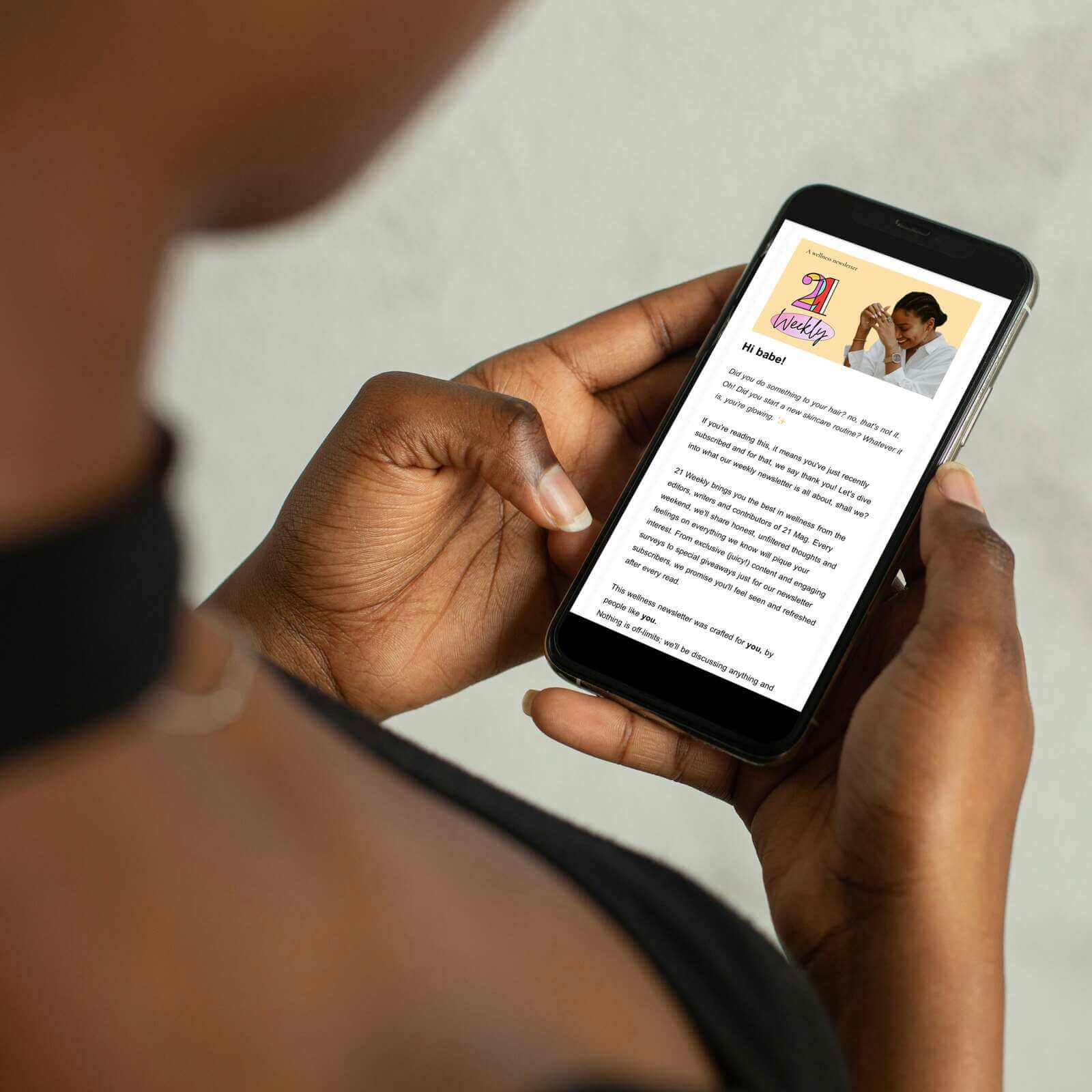In Nigeria, the topic of abortion is often shrouded in secrecy, judgment, and misinformation. Yet, behind closed doors, countless women face difficult choices and, tragically, devastating consequences due to unsafe abortion practices. At 21 Magazine, we believe in shedding light on crucial health conversations, empowering you with knowledge, and advocating for dignified care. That’s why we partnered with Komfot Health, an organization dedicated to making post-abortion care accessible and holistic.
We spoke with Sanasi Amos, Komfot Health’s founder, a certified holistic sex educator, therapist, and post-abortion care doula with seven years of experience. Her vision for Komfot Health was born from the heartbreaking reality that 54 Nigerian women die daily from unsafe abortion complications. Sanasi’s mission is clear: to dismantle barriers to care, combat the pervasive fear of judgment, and ensure women receive comprehensive support.
She highlighted various reasons for post-abortion deaths, noting that the most common is delayed healthcare-seeking due to a lack of awareness that post-abortion care is legal. “Even when women are aware of their rights, they are hesitant to seek care because of the fear of judgment,” Sanasi explained. “We’ve even seen some providers outrightly deny patients pain management medication when carrying out the evacuation of an incomplete abortion.” She further emphasized the systemic issues: “The healthcare system in Nigeria is also underdeveloped. Once an evacuation is done, even in the most traumatic way, people cannot get mental health support because care is not designed to be holistic in Nigeria.”
Sanasi Amos has illuminated ten crucial facts about abortion and post-abortion care in Nigeria that every woman needs to know.
10 Critical Facts About Abortion and Post-Abortion Care in Nigeria:
1. Abortions happen even with the restrictive laws, which means 90% of abortions that happen in Nigeria are unsafe.
Despite legal restrictions, abortions are a reality for many Nigerian women. The alarming statistic that 90% are unsafe underscores a severe public health crisis. These unsafe procedures often occur in clandestine environments, performed by untrained individuals using dangerous methods, leading to severe complications, injury, and death. It’s a stark reminder that restrictive laws do not eliminate abortions; they only push them underground, making them deadly.
2. Not many people know that a miscarriage is a spontaneous abortion.
The medical term for a miscarriage is “spontaneous abortion.” This often comes as a surprise to many, highlighting the stigma associated with the word “abortion.” Understanding this distinction can help destigmatize the broader conversation around pregnancy loss and medical interventions. Whether spontaneous or induced, the need for safe, compassionate medical care remains paramount.
3. 54 women die every day in Nigeria from the complications of an unsafe abortion; that is 20,000 women a year.
These cases were documented by the Society of Obstetrics and Gynecologists of Nigeria. This devastating figure might look only like a statistic but it represents mothers, daughters, sisters, and friends whose lives are cut short unnecessarily. The fact that these are documented cases suggests the true number is likely much higher, with countless deaths going unreported. This daily tragedy is a preventable crisis, rooted in lack of access to safe care, information, and support.
4. Sepsis is the most common reason people die after an unsafe abortion.
Sepsis is when you get an infection from the decaying retained product of conception, and your body, in an attempt to fight off the infection, goes into an override and begins to attack your organs.
Following an unsafe abortion, if fetal tissue is not completely removed, it can lead to severe infection. This infection can rapidly overwhelm the body, causing organ failure and death. Early recognition and immediate medical intervention are crucial to prevent this devastating outcome.
5. There are only two methods of abortion approved by the WHO
The World Health Organization (WHO) sets global standards for safe healthcare. For abortion, they endorse two primary methods: medication abortion using specific drugs (Mifepristone and Misoprostol) and surgical abortion, specifically Manual Vacuum Aspiration (MVA). Any other method, especially the use of unapproved injections, poses significant health risks and should be avoided at all costs. Knowing these approved methods is critical for advocating for safe care.
6. Abortions are not illegal in Nigeria; they are restrictive because certain conditions permit the termination of a pregnancy. However, it should be approved by a medical doctor that the pregnancy is high-risk.
This is a critical point of clarification. While abortion law is restrictive, it’s not an outright ban. Under specific circumstances, particularly when a pregnancy poses a threat to the mother’s life or health, termination is legally permissible. The crucial step here is medical assessment and approval by a qualified doctor. Misunderstanding this legal nuance often leads to women seeking unsafe options out of fear or lack of accurate information.
7. 70% of unsafe abortions happen among suburban and rural women, who still use harmful methods like drinking dye, inserting cassava stems, or an iron hanger through the vagina into the cervix to cause tenderization of the cervix for contraction to occur.
This statistic shines a light on profound health inequities. Women in suburban and rural areas often have limited access to information, education, and safe healthcare facilities. This vulnerability forces them to resort to incredibly dangerous and often fatal traditional methods. These practices are horrific and cause immense suffering, highlighting the urgent need for expanded access to reproductive health education and services across all communities.When abortion laws are as restrictive as they are in Nigeria, the grim reality is that safe abortions become a privilege, leaving poor women to suffer dangerous, often fatal, alternatives.
8. All government hospitals in Nigeria have post-abortion care units. If you’ve had an unsafe abortion, please do not be scared; it is your right to get care.
Regardless of how a pregnancy ended, post-abortion care is a fundamental health right, and government hospitals are mandated to provide it. Fear of judgment, legal repercussions, or simply not knowing this right often prevents women from seeking crucial, life-saving care after an unsafe procedure. It is vital to remember that seeking care for complications is not an admission of guilt.
9. Abortion, when done safely, is safer than childbirth; unsafe abortions are what lead to complications.
This fact challenges common misconceptions. When performed by trained medical professionals using approved methods, abortion is a remarkably safe procedure. The dangers arise solely from unsafe practices. Conversely, childbirth, while a natural process, carries its own set of risks and potential complications. This comparison underscores that the issue isn’t abortion itself, but the lack of access to safe abortion and post-abortion care.
10. Having conversations about abortions is not a crime; having an unsafe abortion is what is a crime. When people are educating people about abortions, it is because access to education is a fundamental right, have conversations so we all can demystify abortions.
The silence surrounding abortion is a significant barrier to progress in our overall sexual health. Fear of discussing the topic openly prevents crucial information from reaching those who need it most. Sanasi emphasizes that education and open conversation are fundamental rights. By talking about abortion, we can demystify it, dispel myths, combat stigma, and ultimately save lives by empowering women with accurate information about safe care and their rights.
The work of Komfot Health and the insights from Sanasi Amos are critical in our pursuit of a healthier, more informed Nigeria. By understanding these truths, we can challenge misconceptions, advocate for better access to care, and ultimately ensure that no more women lose their lives to unsafe abortions. Let’s continue these conversations, bravely and openly.







